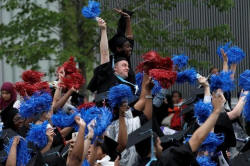|
Survey finds unity among
U.S. young, old in a divisive time
 Send a link to a friend
Send a link to a friend
 [November 17, 2016]
By Mark Miller [November 17, 2016]
By Mark Miller
CHICAGO
(Reuters) - At a moment of sharp national division, here is a bit of
good news: young and old are not at one another’s throats in this
country.
A survey released on Thursday finds Americans of all ages have very
little interest in the myth of “generation war” we hear about so often
in debates about federal spending and entitlements, or from
narrow-minded pundits pointing a finger at boomers for screwing it all
up for millennials.
Instead, the generations seem to recognize their interdependence and
respect one another, according to Encore.org, which has played a key
role over the past decade in developing ideas and networks aimed at
tapping in to the human potential of older Americans for the greater
good.
The survey found that young and old are remarkably in tune on the need
for intergenerational cooperation as a source of national strength
during a time of rapid population aging, growing racial diversity and
political strife.
The survey research is tied to a major new youth mentoring initiative
unveiled by the San Francisco-based nonprofit, whose Generation to
Generation campaign aims to recruit and mobilize more than a million
older adults to help young people thrive.

The survey findings are remarkable, considering the yawning generational
gap on display in last week’s presidential election. Exit polling found
that voters aged 18 to 29 preferred Hillary Clinton by a whopping 18
percentage-point margin, and voters aged 30 to 44 went for the Democrat
by 8 points. Older voters preferred Republican Donald Trump by 8 to 10
percentage points.
“This isn’t a happy moment for common ground in America,” said Paul
Taylor, a consultant to Encore on the survey and author of "The Next
America: Boomers, Millennials, and the Looming Generational Showdown" (PublicAffairs,
January 2016).
“But it’s incumbent on us all to understand not just the sources of
difference, but the possibilities for common ground - and this is one
very real area of possibility.”
MENTORS NEEDED
The survey casts refreshing light on where that common ground might be
found. Sixty-five percent of respondents agree that the country’s
growing diversity, and cooperation between old and young, can be a
source of national strength in the years ahead. And more of today’s
young people say they have very close, loving relationships with their
parents (50 percent) than do today’s older adults (45 percent).
Encore’s campaign aims to change the national conversation on the role
older people can play in the lives of the young. “We want to convey the
message that instead of hanging on to fast-fading youth, older people
need to be there for the young,” said Marc Freedman, Encore’s founder
and CEO.
The campaign aims to mobilize at least 1 million older adults to “stand
up and show up for kids,” he said, in schools and youth organizations.
The project also will showcase cities where youth mentoring is working
well. The campaign’s initial city focus will include Los Angeles,
Boston, Seattle and San Jose, California.
[to top of second column] |

Graduating students of the City College of New York cheer during the
College's commencement ceremony in the Harlem section of Manhattan,
New York, U.S., June 3, 2016. REUTERS/Mike Segar

The emphasis will be on kids in need. Encore’s research shows that 16
million young people reach age 19 without ever having any kind of adult
mentoring, including 9 million at-risk youth. Two-thirds of affluent
children have some form of mentoring beyond their immediate families,
while the same share of low-income children do not.
Mentoring is hardly a new idea. By some estimates, there are more than
5,000 mentoring programs in the United States, and research affirms it
can be very effective at improving behavioral, social, and academic
outcomes. But many programs have long lists of children awaiting
mentors, and recruiting is where Encore hopes to play a role.
And even though they have the time, older adults are not the most likely
to volunteer, according to the U.S. Bureau of Labor Statistics (BLS).
That honor belongs to people aged 35 to 55. And the rate of volunteering
among Americans aged 55 to 64 actually has been declining somewhat, BLS
found.
"If you asked the consultants to design the perfect group of people to
serve as a resource for kids, then you’d come up with a population that
looks pretty much like the older population today,” said Freedman.
“As people get older, they have a natural impulse to connect, and
research shows that they are three times more likely to be happy when
they are in a mentoring relationship. But we’ve been working
systematically for the last 50 years to separate them through things
like age-segregated housing.”
So that is the upbeat news in a week when we are hearing a lot about
division and strife. One last bright spot to report: The Encore survey
also asked Americans this question: “What makes America great?”

Among the answers: our work ethic, the chance for future generations to
prosper, our form of government, military strength. But here was the
most frequent answer: individual freedom and liberty.
Information about the campaign is available here: http://bit.ly/2f0OwrJ
(Editing by Matthew Lewis)
[© 2016 Thomson Reuters. All rights
reserved.] Copyright 2016 Reuters. All rights reserved. This material may not be published,
broadcast, rewritten or redistributed. |